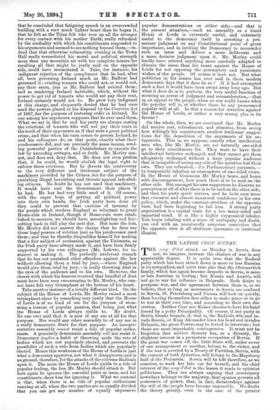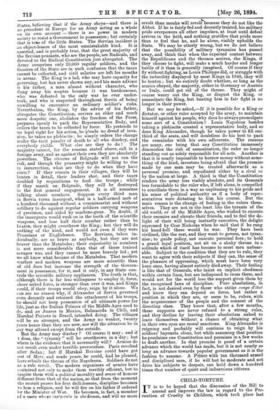THE LATEST COUP D'_ETAT. T HE coup d'etat struck on Monday
in Servia does not, we imagine, increase the chances of war in any appreciable degree. It is quite true that the Radical party which has been struck down is more or less Russian in its sympathies, and quite true also that the Obrenovitch family, which has again become despotic in Servia, is more or less Austrian in feeling ; but Russia and Austria will not go to war for influence in Belgrade. Both desire to postpone war, and the agreement between them is, as we believe, that so long as movements in Servia are confined to Servia, St. Petersburg and Vienna will look on quietly, thus leaving themselves free either to make peace or to go to war at their own time, and according to their own dis- cretion. Neither Czar nor Kaiser chooses to have his hand forced by a petty Principality. Of course, if any party in Servia breaks bounds, if, that is, the Radicals win and in- vade Bosnia, or King Alexander loses his head and invades Bulgaria, the great Powers may be forced to intervene ; but those are most improbable contingencies. It must not be forgotten that neither dynasty has, as a dynasty, the slightest interest in a premature occupation of Servia. If the great war comes off, the little State will, under cover of one arrangement or another, belong to the victor, and if the war is averted by a Treaty of Partition, Servia, with the consent of both dynasties, will belong to the Hapsburg half of the Peninsula. Servia will be left therefore, as we conceive, to work her ,fate out for herself, and the chief interest of the coup d'etat is the lesson it reads to optimist politicians. They are always arguing that sovereignty nowadays belongs to the majority, that opinion governs all possessors of power, that, in fact, dictatorships against the will of the people have become impossible. We doubt the theory greatly, even in the case of the greater States, believing that if the Army obeys—and there is no precedent in Europe for an Army actmg as a whole on its own account — there is no power in modern society to resist a Government in possession ; but certainly that is true of the little States. The Servian incident is an object-lesson of the most unmistakable kind. It is asserted, and is probably true, that the great majority of the Servian peasants, who are the people, are Radicals, and devoted to the Radical Constitution just abrogated. The Army comprises only 20,000 regular soldiers, and the finances of the State are in such confusion that the taxes cannot be collected, and civil salaries are left for months in arrear. The King is a lad, who may have capacity for governing, but has never shown any, and his main adviser is his father, a man almost without character, who flung away his sceptre because it was burdensome, who was defeated in the only war he ever under- took, and who is suspected throughout Servia of being unwilling to encounter an ordinary soldier's risks. Nevertheless, the King. by the advice of his father, abrogates the Constitution, revives an older and much more despotic one, abolishes the freedom of the Press, prepares openly to pack the Representative Body, and orders the taxes to be collected by force. He pretends to no legal right for his action, he pleads no dread of inva- sion, he takes no plebiscite ; he simply orders the change under the tacit penalty of death to all who disobey, and everybody yields. What else are they to do ? The majority cannot, for the reasons stated above, call in a foreign army, and as against their own they are absolutely powerless. The citizens of Belgrade will not run the risk, and though the peasantry might be willing to rise in insurrection, what are they to do when they have risen ? If they remain in their villages, they will be beaten in detail, their leaders shot, and their taxes doubled by requisitions to feed the troops ; while if they march on Belgrade, they will be destroyed in the first general engagement. It is all nonsense talking about numbers. Suppose every third man in Servia turns insurgent, what is a half-armed mob of a hundred thousand without a commissariat and without artillery to do against regular soldiers carrying weapons of precision, and aided by machine-guns. No doubt, if the insurgents would rush on in the teeth of the scientific weapons, and lose half their number rather than be beaten, they might overthrow the King; but they will do nothing of the kind, and would not even if they were Prussians or Englishmen. The Servians, taken in- dividually, are as brave as anybody, but they are not braver than the Matabeles ; their superiority in numbers is not more considerable than that of those trained savages was, and they cannot be more bravely led ; yet we all know what became of the Matabeles. That modern warfare and modern weapons are more scientific than of old does but increase the strength of the Govern- ment in possession, for it, and it only, in any State con- trols the scientific military appliances. The truth is that, _although there is far less willingness to employ it, force, sheer naked force, is stronger than ever it was, and Kings could, if their troops would obey, reign by it alone. We can see no reason why, if Alexander of Servia governed even decently and retained the attachment of his troops, he should not keep possession of all ultimate power for life, just as the Italian Princes of the Middle Ages used to do, and as Juares in Mexico, Balmaceda in Chili, and Marshal Peixoto in Brazil, intended doing. The villages will be no stronger, and the Army no weaker, twenty years hence than they are now, nor will the situation be in any way altered except from the outside. But the Army may disobey ? Of course it may ; and if t does, the " tyranny " will be overthrown in a day ; but where is the evidence that it necessarily will ? Armies do not revolt even under terrible provocation. Paris revolted after Sedan ; but if Marshal Bazaine could have got out of Metz, and made peace. he could, had he pleased, have rebuilt the throne of the Napoleons. Soldiers do not as a rule revolt. The modern organisers of armies have contrived not only to make them terribly efficient, but to inspire them with a political morality and sense of honour different from that of the nation, so that from the moment the recruit passes his first drill-lessons, discipline becomes to him a religion, and he will fire on his father if ordered by the Minister of War. He becomes, in fact, a member of a caste wbe as case-rule is obedience, and will no more revolt than monks will revolt because they do not like the Abbot. If he is fairly fed and decently treated, his military pride overpowers all other impulses, at least until defeat arrives in the field, and nothing gratifies that pride more than to feel that he, and he alone, visibly upholds the State. We may be utterly wrong, but we do not believe that the possibility of military tyrannies has passed away, and think that when the expected contest between the Republicans and the thrones arrives, the Kings, if they choose to fight, will make a much harder and longer battle of it than is generally imagined. Of course if they fly without fighting, as Louis Philippe did, or struggle with the imbecility displayed by most Kings in 1848, they will be beaten ; but we entirely doubt whether, so long as the armies obeyed, the majority, either in Germany or Austria or Italy, could get rid of the throne. They might of course weary out the King, or disgust the King, or assassinate the King, but beating him in fair fight is no longer in their power.
But we may be asked,—If it is possible for a King or dictator, or other ruler accepted by the army, to maintain himself against his people, why does he always promulgate some sort of a Constitution ? Louis Napoleon besides taking a plebiscite created a representative body, and so does King Alexander, though he takes power to fill one- third of the seats, and will doubtless do his best to pack the remainder with his own adherents. The reasons are many, one being that any Constitution immensely diminishes the risk of assassination, the ruler no longer standing out as solely responsible for all acts. Another is that it is nearly impossible to borrow money without some- thing of the kind, investors being afraid that the promise made by one man may be treated afterwards as a personal promise, and repudiated either by a rival or by the nation at large. A third is that the Constitution renders the army less visibly absolute, and its Generals less formidable to the ruler who, if left alone, is compelled to conciliate them in a way as unpleasing to his pride and his sense of political authority as if a body of repre- sentatives were dictating to him his course. But the main reason is the change of feeling in the rulers them- selves. They are not in the least like the tyrants of the old world, or of the Middle Ages, who wished to execute their enemies and elevate their friends, and to feel the de- light of their will being instantly executive, the delight expressed by Czar Nicholas when he said that if he rang his hand-bell there would be war. They have been civilised, like the rest, and they want to govern, not tyran- nise ; to guide policy, not execute personal foes ; to hold a grand legal position, not sit on a shaky throne in a solitude which of itself has become to most men unbear- able. Subject to the condition that they are to rule, they want to agree with their subjects if they can, the sense of the pleasure of oppressing, which must have been very keen once, having almost entirely died away. Their feeling is like that of Generals, who insist on implicit obedience within certain lines, but are indisposed to cross them, and would not for the world lose the support given them by the recognised laws of discipline. Pure absolutism, in fact, is not desired even by those who strike coups d'otat and know they can depend on force, but rather a position in which they are, or seem to be, rulers, with the acquiescence of the people and the consent of the directing class. They know that, after a few months, these supports are never refused to a strong ruler, and they decline by leaving their absolutism naked to leave themselves without a chance of obtaining what in their own eyes are moral sanctions. King Alexander is reigning and probably will continue to reign by his soldiers' bayonets alone, but while assuming that position he proclaims one Constitution and promises in a few weeks to draft another. In that promise is proof of a certain advance which the world has made, but it is not nearly so long an advance towards popular government as it is the fashion to assume. A Prince with ten thousand armed and disciplined men, if he will but be moderate and not drive his subjects to despair, can hold down a hundred times that number of quiet and industrious citizens.



































 Previous page
Previous page